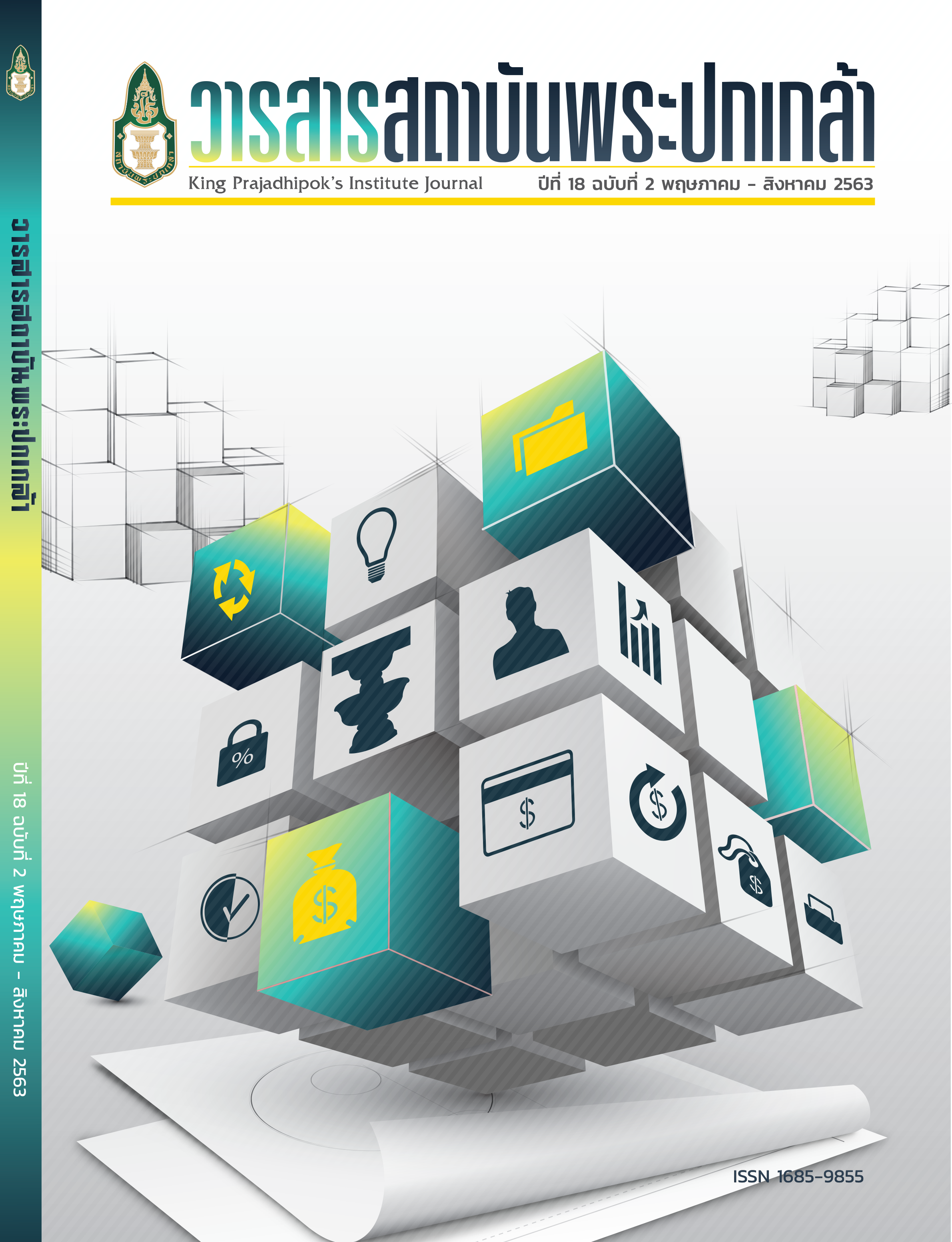Collaborative Local Governance in Supporting the Elderly’s Activities to Preserve and Adapt Local Wisdom – Sin-Sai Folksinger
Main Article Content
Abstract
This study aims to 1) seek to understand the history of traditional Sin-Sai folk singing in Huai-Wah Village, Non Khong Sub-district, Ban Fang District, Khon Kaen Province 2) investigate the aging of traditional Sin-Sai folk singer and consequent impacts; 3) seek to highlight guidelines on building local collaboration in the support of elderly activities in protection and application of Intangible cultural heritage of Sin-Sai folk singing, and 4) propose policy recommendations for takeholders regarding the protection of Intangible cultural heritage of Sin-Sai folk music. The research employed qualitative methodology using a participatory action research process. The study revealed that the history of traditional Sin-Sai folk music in Ban Huai Wa (Huai Wa Village) began around 1957 (B.E 2500. There were two of traditional Sin-Sai folk music groups, namely the Boo Buntengsil Band and the Chalee Buntengsil Band. However, around the year 1965 (B.E 2508), traditional Sin-Sai folk singing began to lose popularity and was replaced by the era of Mor Lam Plearn (traditional Isan folk singing), with the establishment of three Mor Lam Plearn bands.
Finding regarding the local history include: 1) Ban Huai Wa is truly a community of Mor Lam 2) Mor Lam was an important activity in promoting and developing youth in the past 3) Mor Lam and the income raising of the community in the past 4) expanding the worldview from traveling to perform Mor Lam in various places. In terms of the impacts and the aging of the performers of traditional Sin-Sai folk singing, it can be concluded that 1) elderly traditional Sin-Sai performers suffer health problems; 2) disapproval and unreadiness of the elderly audiences towards the traditional Sin-Sai folk singing; 3) the attitude of family members against the traditional Sin-Sai folk performers 4) no prior existence of elderly groups of the traditional Sin-Sai folk singers in the village 5) an absence from the traditional Sin-Sai folk singing causes to forgetting the poem 6) negative attitude of the elderly Sin-Sai performers towards the new generation of children and youths; traditional Sin-Sai folk singing towards the new generation of children and youths; 7) positive attitude of youths towards the elderly Sin-Sai performers; 8) relevant agencies lack clarity in their role in protection and application of Intangible cultural heritage of Sin- Sai folk singing 9) budgetary concerns in promoting elderly activities for protection and application of Local Intangible Cultural Heritage 10) lack of a key leader in increasing activities for protection and application of local intangible cultural heritage in the village.
Guidelines for building local collaboration in the support of elderly activities comprise:
1) searching for local historical and cultural information 2) the process of raising awareness and acknowledgement of local history and culture 3) brainstorming and planning for protection and application of Intangible cultural heritage of Sin-Sai folk music,particularly through the network-based approach 4) concrete action taken by the network 5) working in collaboration on assessment.
Policy recommendations for stakeholders in the protection of intangible cultural heritage of Sin-Sai folk singing consist of: 1) building collaboration on local tourism management through the cultural capital- based approach 2) safeguarding and revitalization of Local intangible cultural heritage at both provincial and sub-district levels 3) formulation of a plan for the development of local intangible cultural heritage 4) enhancing networks for protection and application of Intangible cultural heritage of Sin-Sai folk singing.
Article Details
@ 2020 King Prajadhipok's Institute The Government Complex Commemorating All Right Reserved.
References
กรมกิจการผู้สูงอายุ. (2561). มาตรการขับเคลื่อนระเบียบวาระแห่งชาติ เรื่องสังคมผู้สูงอายุ. กรุงเทพฯ: โรงพิมพ์สามละดา.
คณะกรรมการผู้สูงอายุแห่งชาติ. (2561). แผนพัฒนาผู้สูงอายุฉบับที่ 2 (พ.ศ. 2545 – 2564) ฉบับปรับปรุงครั้งที่ 2 พ.ศ. 2561. สืบค้นจาก http://www.dop.go.th/download/laws/law_th_20152309144546_1.pdf
นันทิยา หุตานุวัตร และณรงค์ หุตานุวัตร. (2546). การพัฒนาองค์กรชุมชน. กรุงเทพฯ: สถาบันองค์กรชุมชน (องค์การมหาชน).
ประเวศ วะสี. (2557). พลังการขับเคลื่อนการจัดการตนเองบนแผ่นดินไทย. กรุงเทพฯ: หมอชาวบ้าน.
พระราชบัญญัติเทศบาล พ.ศ. 2496. (2496, 17 กุมภาพันธ์). ราชกิจจานุเบกษา. ฉบับกฤษฎีกา 70 ตอนที่ 14ก. น. 222-257.
พระราชบัญญัติเทศบาล (ฉบับที่ 12) พ.ศ. 2546. (2546, 22 ธันวาคม). ราชกิจจานุเบกษา. ฉบับกฤษฎีกา 120 ตอนที่ 124ก. น. 1-15.
พระราชบัญญัติเทศบาล (ฉบับที่ 13) พ.ศ. 2552. (2552, 13 พฤศจิกายน). ราชกิจจานุเบกษา. ฉบับกฤษฎีกา 126 ตอนที่ 85ก. น. 7-9.
พระราชบัญญัติส่งเสริมและรักษามรดกภูมิปัญญาทางวัฒนธรรม พ.ศ. 2559. (2559, 1 มีนาคม). ราชกิจจานุเบกษา. ฉบับกฤษฎีกา 133 ตอนที่ 19ก. น. 1-9.
พัชรี สิโรรส. (2557). การจัดการปกครองและนโยบายสาธารณะ. วารสารการเมืองการปกครอง, 4(2), 1-12.
มูลนิธิสถาบันวิจัยและพัฒนาผู้สูงอายุไทย. (2559). สถานการณ์ผู้สูงอายุไทย 2559. กรุงเทพฯ: คณะกรรมการผู้สูงอายุแห่งชาติ (กผส.).
วรรณดี สุทธินรากร. (2560). การวิจัยเชิงปฏิบัติการแบบมีส่วนร่วมและกระบวนการทางสำนึก. พิมพ์ครั้งที่ 2. กรุงเทพฯ: ศยาม.
วสันต์ เหลืองประภัสร์. (2557). การศึกษาและรวบรวมตัวอย่างการบริหารกิจการบ้านเมืองแบบร่วมมือกัน (Collaborative Governance) ระหว่างภาครัฐ องค์กรปกครองส่วนท้องถิ่น ภาคธุรกิจเอกชน ภาคประชาสังคมและชุมชน. กรุงเทพฯ: มหาวิทยาลัยธรรมศาสตร์.
วิชัย รูปขำดี และคณะ. (2552). การประเมินองค์กรปกครองส่วนท้องถิ่นที่มีความเป็นเลิศเพื่อรับรางวัลพระปกเกล้าประจำปี 2552. กรุงเทพฯ: สถาบันพระปกเกล้า.
วีระ โรจน์พจนรัตน์. (2551). การจัดการวัฒนธรรมกับความเจริญของประเทศ. วารสารเทคโนโลยีสุรนารี, 2(2), 85-97.
วีระศักดิ์ เครือเทพ. (2547). ทุนทางสังคมกับการจัดการภาครัฐยุคใหม่: กรณีศึกษาความร่วมมือของชุมชนกับ อบต. ในการจัดการปัญหาผลกระทบภายนอก. ใน ดิเรก ปัทมสิริวัฒน์ (บรรณาธิการ), ทุนทางสังคม และวัฒนธรรมในระบบเศรษฐกิจ และการจัดการยุคใหม่ รวมบทความจากการประชุมวิชาการ ประจำปี 2547 มหาวิทยาลัยนเรศวร. กรุงเทพฯ: บริษัท พี.เอ ลีฟวิ่ง จำกัด.
วีระศักดิ์ เครือเทพ. (2550). เครือข่าย : นวัตกรรมการทำงานขององค์กรปกครองส่วนท้องถิ่น : บทวิเคราะห์ว่าด้วยการบริหารงานขององค์กรปกครองส่วนท้องถิ่นในแนวระนาบเพื่อเพิ่มขีดความสามารถในการปฏิบัติงานและความรับผิดชอบสาธารณะ. กรุงเทพฯ: สำนักงานกองทุนสนับสนุนการวิจัย.
สถาบันพระปกเกล้า. (2555). ไขรหัสลับท้องถิ่นสไตล์ Out of the Box. กรุงเทพฯ: วิทยาลัยพัฒนาการปกครองท้องถิ่น สถาบันพระปกเกล้า.
สุนทรชัย ชอบยศ. (2563). การบริหารจัดการเครือข่ายภาคสาธารณะ Public Governance. พิมพ์ครั้งที่ 2. ขอนแก่น: โรงพิมพ์มหาวิทยาลัยขอนแก่น.
สุนทรชัย ชอบยศ. (2562ก). ประวัติศาสตร์ท้องถิ่นเพื่อการพัฒนาท้องถิ่นที่เข้มแข็งและยั่งยืน. วารสารสถาบันพระปกเกล้า, 17(2), 115-138.
สุนทรชัย ชอบยศ. (2562ข). สินไซธิปไตย. มหาสารคาม: ศูนย์ญาครูขี้หอมศึกษาเพื่อการพัฒนาท้องถิ่น.
สุนทรชัย ชอบยศ และคณะ. (2562ก). กลอนลำและประวัติศาสตร์หมอลำสินไซบ้านห้วยหว้า ตำบลโนนฆ้อง อำเภอบ้านฝาง จังหวัดขอนแก่น. มหาสารคาม: อภิชาตการพิมพ์.
สุนทรชัย ชอบยศ และคณะ. (2562ข). คู่มือแนวทางการสร้างความร่วมมือในการส่งเสริมกิจกรรมผู้สูงอายุเพื่อการอนุรักษ์และประยุกต์มรดกภูมิปัญญาทางวัฒนธรรมของท้องถิ่น. มหาสารคาม: วิทยาลัยการเมืองการปกครอง มหาวิทยาลัยมหาสารคาม.
สุนทรชัย ชอบยศ และคณะ. (2562ค). แนวทางการสร้างความร่วมมือขององค์กรปกครองส่วนท้องถิ่นในการส่งเสริมกิจกรรมผู้สูงอายุในการอนุรักษ์และประยุกต์ใช้มรดกภูมิปัญญาทางวัฒนธรรมของท้องถิ่น : กรณีศึกษาการอนุรักษ์หมอลำสินไซ ตำบลโนนฆ้อง อำเภอบ้านฝาง จังหวัดขอนแก่น. มหาสารคาม: รายงานวิจัย สำนักงานกองทุนสนับสนุนการวิจัย.
เสรี พงศ์พิศ. (2548). เครือข่ายยุทธวิธีเพื่อประชาคมเข้มแข็ง ชุมชนเข้มแข็ง. กรุงเทพฯ: เจริญวิทย์การพิมพ์.
เสรี พงศ์พิศ. (2551). แนวคิด แนวปฏิบัติ ยุทธศาสตร์การพัฒนาท้องถิ่น. กรุงเทพฯ: เจริญวิทย์การพิมพ์สนธยา.
เอนก เหล่าธรรมทัศน์. (2552). แปรถิ่นเปลี่ยนฐาน: สร้างการปกครองท้องถิ่นให้เป็นฐานของประชาธิปไตย. กรุงเทพฯ: สำนักพิมพ์มหาวิทยาลัยธรรมศาสตร์.
Goldsmith, Stephen & Eggers, William D. (2004). Governing by Network: The New Shape of the Public Sector. Washington, D.C.: Brookings Institution Press.
Rhodes. (1996). The New Governance: Governing without Government. Political Study, XLIV.
Rhodes. (2000). Governance and Public Administration. In J. Pierre (Ed.), Dedating Governance: Authority,Steering, and Democracy. New York, NY: Oxford University Press.


